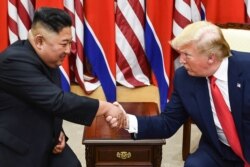North Korea does not appear to be preparing a major provocation at the onset of the administration of President-elect Joe Biden, according to the top U.S. general in South Korea, amid concerns Pyongyang could soon conduct a missile or other weapons test.
“We're not seeing any indicators that suggest that there would be a major provocation -- but that's today. That could change next week,” General Robert Abrams, the commander of U.S. Forces Korea, told an online forum Tuesday.
North Korea has often timed major tests, including of ballistic missiles or nuclear weapons, around U.S. presidential transitions, an effort to demonstrate its military capabilities and possibly gain leverage in future negotiations with Washington.
But so far North Korea has been quiet since Biden’s election win. Instead, Pyongyang has focused on its economy, which has been battered by coronavirus-related border closures, ongoing international sanctions, and recent major floods.
In October, North Korea used a military parade to unveil a massive new intercontinental ballistic missile, which appears designed to overwhelm U.S. missile defenses. Some suspect Pyongyang may test the missile in the coming months.
Abrams said the United States is closely watching North Korea during its upcoming Eighth Party Congress, an important political meeting that could provide a hint of Pyongyang’s foreign and domestic policy direction.
“We're all eagerly awaiting to see what will come out of that. There's potential that there will be various policy announcements,” Abrams told the forum, hosted by the Institute for Corean-American Studies (ICAS).
Abrams said the United States and its ally, South Korea, have a “very large quiver full of a lot of different arrows” with which to respond, but cautioned there is not a “one-size-fits-all” response to North Korean provocations.
“We are much more nuanced than that. We deal with every situation separately and with a discreet level of analysis and appropriate response. Sometimes the best response is to do nothing,” he said.
North Korean leader Kim Jong Un said a year ago he no longer feels bound by his self-imposed pause on nuclear and long-range missile tests, raising concerns of a return to major tensions on the Korean peninsula.
But since then, the North has conducted only occasional short-range missile tests. Though many of the smaller launches violate U.N. Security Council resolutions, U.S. President Donald Trump has downplayed their significance.
Kim and Trump met three times, including a historic summit in Singapore in June 2018. The meeting, the first of its kind between the sitting leaders of the two countries, resulted in a vaguely worded agreement to work toward the denuclearization of the Korean Peninsula and improve bilateral relations. Follow-up talks failed to achieve those goals.
Biden has said he won’t rule out meeting Kim face-to-face, but has suggested that would only come as part of broader, working-level talks. Biden, who helped oversee former President Barack Obama’s policy of “strategic patience” toward North Korea, has repeatedly criticized Trump’s personal outreach to Kim, saying the strategy is ineffective and aimed more at creating headlines than addressing the North Korean nuclear issue.
At his election rallies, Biden frequently called Kim a "thug," "tyrant," and "dictator." In response, North Korean state media slammed Biden as an "imbecile," a "fool of low IQ," and a "rabid dog."







